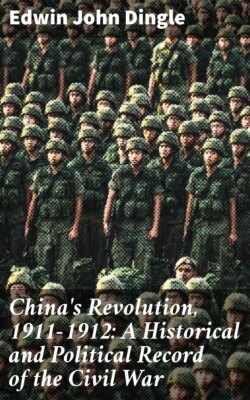Читать книгу China's Revolution, 1911-1912: A Historical and Political Record of the Civil War - Edwin John Dingle - Страница 7
На сайте Литреса книга снята с продажи.
Оглавление"Well, will you be in favour of granting concessions to foreign syndicates for the development of mines and so on?"
"I do not think so. It is impossible for me to say what will be done, but my personal wish would be freely to combine foreign capital with Chinese capital and labour." But the General, at this moment turning abruptly towards a staff officer who brought him a dispatch from the battlefield, announced, "But we shall have foreign advisers, and all such matters as this would be decided later." And he added forcefully, "We must consolidate the whole of China—that is the main thing."
"You spoke of foreign loans just now. There will be need for foreign loans now more than ever?"
"Yes, we shall need more foreign money and more foreigners in the employ of our Republican Government; but my party is convinced that there will be no difficulty in getting all the assistance, financial and otherwise, from the Powers. Already America has telegraphed her good wishes, and the time will come when the two greatest republics in the world will be on the most friendly footing—probably China will drift more towards America and learn more from her than from any other country."
"As regards business, do you think that Hankow will benefit in trade from the Revolution?"
The General pondered for a moment, thoughtfully putting his thumb and finger to his chin. He hesitated briefly, then declared straight out that he thought Hankow would become, perhaps, the biggest city in Asia.
In concluding our conversation, Li Yuan Hung told me that he had been to Japan for one year only, that he had five children (two boys and three girls), that he was a native of Hwangpi in Hupeh, and that when his children were old enough he would send them away for their education.
"Where to?"
"To America," came the reply, and a happy smile with it. After wishing me goodbye, General Li, still holding my hand, said:—
"One word more before you go." He placed his left hand on my shoulder, bent his body slightly towards me. "Please do not forget to say that this Revolution took place because the Manchus were so unfair to the Chinese—for no other reason."
He then bade me farewell, and I departed.
* * * * *
This interview is given in extenso because of its vital bearing upon the general attitude of the Republican party at the present moment. Events have transpired slightly to throw some of Li Yuan Hung's ambitions to the ground, but the views he held may be taken as the general aims of the party that is headed by Sun Yat Sen to-day. As my manuscript goes forward to the publishers it is a matter of impossibility accurately to predict what the outcome of China's Revolution will be. It may be a Republic; it may be a Monarchy. Be the form of government what it may, however, there will remain in the eyes of every patriotic Chinese but one General Li, and his views on the political situation and the needs of his great country, at the time when her national pendulum tremulously ticked out issues of the highest import, will have a permanent interest for all students of affairs in China.[3]
[1] This was only a month after the Revolution had broken out. The reader will learn later on in this volume of the changes following along in the ensuing months.
[2] Nanking, the city now planned by the Republican party as the capital, after a most stubborn resistance, fell to the Revolutionary Army a fortnight afterwards.
[3] Li Yuan Hung at the time of the Revolution was forty-eight years old. His birthplace was a village in the north of Huangpi, not many miles from the scenes that made him famous. "Li Yuan Hung" was his official name; his friends were permitted to address him as "Li Sung Ching." His father was a soldier before him—Colonel Li Tsao Hsiang. In the year 1882, at the age of eighteen, Li the younger passed the entrance examination of the Tientsin Naval College, and after a course of six years he graduated. Soon after the war with Japan he was engaged by Chang Chih Tung, then Viceroy of Nanking, to fortify that city with modern guns, and was also made commander of an important pass near Nanking. In the year 1894 he followed Chang Chih Tung to Hupeh, and was commissioned to train the new army with the aid of a German instructor for three years. He was then sent to Japan to gain experience in defence work. After two years he returned to Wuchang, and was appointed Major of a Cavalry Brigade. In 1902 he was in command of the Kiangyin Navy and Army manoeuvres. Next year he took command of the Infantry Fourth Advance Guard. Two years later he became commander of the Second Division. As soon as the new army was organised he was promoted to be Colonel of the 21st Mixed Brigade, superintending the naval forces in the Yangtze Valley, the Military Academy and four departments of the Hanyang Arsenal, and the Army College. In the same year (1905) he was elected Provisional Commander of the Changte manoeuvres. He led his Mixed Brigade in the year 1911 to join the Autumn Manoeuvres at Taihu. On October 10, 1911, General Li joined the Revolution, as will be seen hereafter, and was elected Military Governor of Hupeh.
